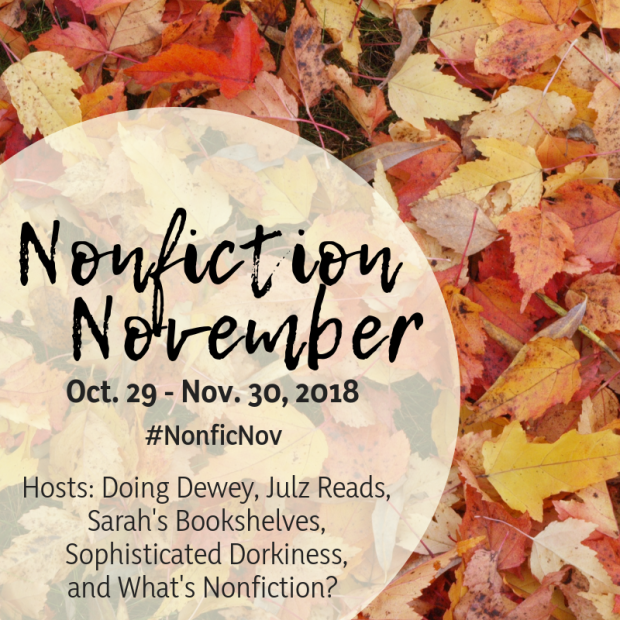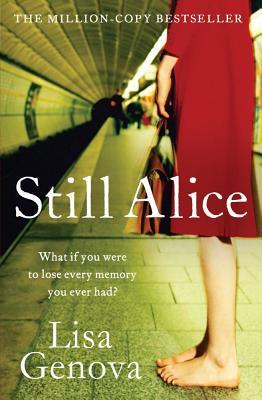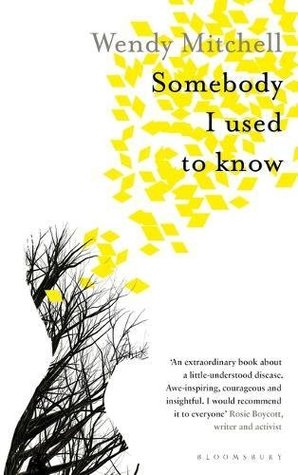
I’d never participated in Nonfiction November before because I tend to read at least 40% nonfiction anyway, but I couldn’t resist the temptation to put together some fiction and nonfiction pairings based on books I’ve read this year and last. (This week of the month-long challenge is posted by Sarah’s Book Shelves, a blog I love for its no-nonsense recommendations of what to read – and what not to read – from the recent U.S. releases.)
My primary example is two books that reveal what it’s really like to have Alzheimer’s disease. Mitchell’s, in particular, is a book that deserves more attention. When it came out earlier this year, it was billed as the first-ever “dementia memoir” (is that an oxymoron?) – except, actually, there had been one the previous year (whoops!): Memory’s Last Breath by Gerda Saunders, which I have on my Kindle and still intend to read. [See also Kate W.’s picks, which include a pair of books with a dementia theme.]
Still Alice by Lisa Genova (2007)
 Genova’s writing, Jodi Picoult-like, keeps you turning the pages; I read 225+ pages in an afternoon. There’s true plotting skill to how Genova uses a close third-person perspective to track the mental decline of Harvard psychology professor Alice Howland, who has early-onset Alzheimer’s disease. “Everything she did and loved, everything she was, required language,” yet her grasp of language becomes ever more slippery even as her thought life remains largely intact. I also particularly enjoyed the descriptions of Cambridge and its weather, and family meals and rituals. There’s a certain amount of suspension of disbelief required – Would the disease really progress this quickly? Would Alice really be able to miss certain abilities and experiences once they were gone? – and ultimately I preferred the 2014 movie version, but this would be a great book to thrust at any caregiver or family member who’s had to cope with dementia in someone close to them.
Genova’s writing, Jodi Picoult-like, keeps you turning the pages; I read 225+ pages in an afternoon. There’s true plotting skill to how Genova uses a close third-person perspective to track the mental decline of Harvard psychology professor Alice Howland, who has early-onset Alzheimer’s disease. “Everything she did and loved, everything she was, required language,” yet her grasp of language becomes ever more slippery even as her thought life remains largely intact. I also particularly enjoyed the descriptions of Cambridge and its weather, and family meals and rituals. There’s a certain amount of suspension of disbelief required – Would the disease really progress this quickly? Would Alice really be able to miss certain abilities and experiences once they were gone? – and ultimately I preferred the 2014 movie version, but this would be a great book to thrust at any caregiver or family member who’s had to cope with dementia in someone close to them.
My rating: 
 Other fictional takes on dementia that I can recommend: Unforgettable: Short Stories by Paulette Bates Alden, The Only Story by Julian Barnes, Everything Under by Daisy Johnson and Turn of Mind by Alice LaPlante.
Other fictional takes on dementia that I can recommend: Unforgettable: Short Stories by Paulette Bates Alden, The Only Story by Julian Barnes, Everything Under by Daisy Johnson and Turn of Mind by Alice LaPlante.
&
Somebody I Used to Know by Wendy Mitchell with Anna Wharton (2018)
 A remarkable insider’s look at the early stages of Alzheimer’s. Mitchell took several falls while running near her Yorkshire home, but it wasn’t until she had a minor stroke in 2012 that she and her doctors started taking her health problems seriously. In July 2014 she got the dementia diagnosis that finally explained her recurring brain fog. She was 58 years old, a single mother with two grown daughters and a 20-year career in NHS administration. Having prided herself on her good memory and her efficiency at everything from work scheduling to DIY, she was distressed that she couldn’t cope with a new computer system and was unlikely to recognize the faces or voices of colleagues she’d worked with for years. Less than a year after her diagnosis, she took early retirement – a decision that she feels was forced on her by a system that wasn’t willing to make accommodations for her.
A remarkable insider’s look at the early stages of Alzheimer’s. Mitchell took several falls while running near her Yorkshire home, but it wasn’t until she had a minor stroke in 2012 that she and her doctors started taking her health problems seriously. In July 2014 she got the dementia diagnosis that finally explained her recurring brain fog. She was 58 years old, a single mother with two grown daughters and a 20-year career in NHS administration. Having prided herself on her good memory and her efficiency at everything from work scheduling to DIY, she was distressed that she couldn’t cope with a new computer system and was unlikely to recognize the faces or voices of colleagues she’d worked with for years. Less than a year after her diagnosis, she took early retirement – a decision that she feels was forced on her by a system that wasn’t willing to make accommodations for her.
The book, put together with the help of ghostwriter Anna Wharton, gives a clear sense of progression, of past versus present, and of the workarounds Mitchell uses to outwit her disease. The details and incidents are well chosen to present the everyday challenges of dementia. For instance, baking used to be one of Mitchell’s favorite hobbies, but in an early scene she’s making a cake for a homeless shelter and forgets she’s already added sugar; she weighs in the sugar twice, and the result is inedible. By the time the book ends, not only can she not prepare herself a meal; she can’t remember to eat unless she sets an alarm and barricades herself into the room so she won’t wander off partway through.
In occasional italicized passages Mitchell addresses her past self, running through bittersweet memories of all that she used to be able to do: “It amazes me now how you did it, because you didn’t have anyone to help you. You were Mum, Dad, taxi, chef, counsellor, gardener and housekeeper, all rolled into one.” Yet it’s also amazing how much she still manages to do as an ambassador for the Alzheimer’s Society and Dementia Friends. She crisscrosses the country to give speeches, attend conferences, and advise universities; she writes a blog and has appeared on radio to promote this book. Like many retired people, she’s found she’s busier than ever, and her engagements help her to feel purposeful and like she’s giving a positive impression of early-stage dementia. No matter that she has to rely on dozens of reminders to self in the form of Post-It notes, iPad alarms and a wall of photographs.
The story lines of this and Still Alice are very similar in places – the incidents while running, the inability to keep baking, and so on. And in fact, Mitchell reviewed the film and attended its London premiere, where she met Julianne Moore. Her book is a quick and enjoyable read, and will be so valuable to people looking to understand the experience of dementia. She is such an inspiring woman. I thank her for her efforts, and wish her well. This is one of my personal favorites for the shortlist of next year’s Wellcome Book Prize for medical reads.
My rating: 
 Other nonfiction takes on dementia that I can recommend: In Pursuit of Memory by Joseph Jebelli and The Summer of the Great-Grandmother by Madeleine L’Engle.
Other nonfiction takes on dementia that I can recommend: In Pursuit of Memory by Joseph Jebelli and The Summer of the Great-Grandmother by Madeleine L’Engle.
Additional pairings I would commend to you (all are books I have read and rated  or above):
or above):
Talk before Sleep by Elizabeth Berg
&
Let’s Take the Long Way Home by Gail Caldwell and Truth and Beauty by Ann Patchett
- Celebrating the strength of female friendship, even in the face of life-threatening illness.
Bad News by Edward St. Aubyn
&
Portrait of an Addict as a Young Man by Bill Clegg
- Vivid portrayals of drug addiction.
Miss Smilla’s Feeling for Snow by Peter Høeg
&
This Cold Heaven by Gretel Ehrlich
- Armchair traveling in Greenland.
Sweetbitter by Stephanie Danler
&
Cork Dork by Bianca Bosker
- Glimpses into the high-class world of fine dining – and fine wine.
 Dear Fahrenheit 451: Love and Heartbreak in the Stacks by Annie Spence is chock-full of recommendations and reading pairs. The Novel Cure is also good for this sort of thing, though it is (no surprise) overwhelmingly composed of fiction suggestions.
Dear Fahrenheit 451: Love and Heartbreak in the Stacks by Annie Spence is chock-full of recommendations and reading pairs. The Novel Cure is also good for this sort of thing, though it is (no surprise) overwhelmingly composed of fiction suggestions.









Great set of pairings, Rebecca. Thanks for alerting me to Cook Dork. I was a big fan of Sweetbitter.
LikeLiked by 1 person
This is an interesting idea. I know that I ought to read books about Alzheimers, but it’s so scary I just stick my head in the sand and hope it won’t happen…..
LikeLiked by 1 person
I can understand that. In Pursuit of Memory by Joseph Jebelli is full of interesting facts, and is hopeful about the research that’s currently in progress. I might recommend that to you over the two I discuss in detail.
LikeLiked by 1 person
I would also recommend In Pursuit of Memory for someone who (like me) avoids reading about dementia; I found it ultimately very reassuring! As a fictional counterpart, although less reassuring, I found Emma Healey’s Elizabeth is Missing very moving.
Rebecca, this is not very relevant to this post, but I had a good book coincidence the other day and thought of you! A memoir (Out of the Woods by Luke Turner) and a novel (The Dreamers by Karen Thompson Walker) both informed me that trees can ‘communicate’ through networks of moss etc, which I’d never heard before, and apparently is true!
LikeLiked by 1 person
That’s a wonderful piece of book serendipity! The Overstory by Powers also discusses tree ‘communication’. Trees seem to have been big in both fiction and nonfiction the last couple of years.
LikeLiked by 1 person
I can recommend the hidden life of trees to both of you
LikeLiked by 1 person
P.S. From a Low and Quiet Sea by Donal Ryan opens with “Let me tell you something about trees. They speak to each other…” !!
LikeLike
Awh – thanks for the shout-out! I loved Sweetbitter, have Truth & Beauty on my TBR list, and now want to read Still Alice!
LikeLiked by 1 person
Thanks for some more books to add to the “to read” list. One that I would recommend on the topic of Alzheimer’s is by Can. Singer Songwriter, Jann Arden, “Feeding My Mother: Comfort And Laughter In The Kitchen As My Mom Lives With Memory Loss”. It is an engaging read that had me both laughing and crying.
LikeLiked by 1 person
That sounds wonderful, thank you! I’ll add it to my TBR right away.
LikeLiked by 1 person
You are welcome.
LikeLike
I love these posts even though I don’t read a lot of NF myself (maybe because I don’t?). I don’t know if I’ve ever seen a female friendship pairing before – that’s a good one! I read Talk Before Sleep a long time ago – so sad – and I have Truth & Beauty but haven’t read it yet.
LikeLiked by 1 person
Great pairings Rebecca – in this case, the factual appeals to me more than the fiction.
LikeLiked by 1 person
A memoir of dementia, what an amazing perspective to write from. I’ve not read Summer of the Great-Grandmother for ages, but have been meaning to reread it as well. We don’t like to think about this part of our lives but it should not be forgotten.
LikeLiked by 1 person
Such interesting and varied themes you’ve shared throughout your pairings. Still Alice is one of my all time favourite books, so I’ll definitely be checking out some of the nonfiction titles you’ve recommended with that. Thanks for sharing!
LikeLiked by 1 person
This Cold Heaven is one of my all-time favourites books. Possibly top 3, I thought it was that good
LikeLiked by 1 person
It’s brilliant, I agree. A 5-star read for me earlier this year. A very nonstandard travel book, and gorgeously written.
LikeLike
I’ve had The Long Way Home on my TBR list ever since someone (maybe you?) posted the book’s opening line. I fell in love at first sentence!
LikeLiked by 1 person
I’ll have to go back and read the first lines! I don’t think it was me, but I’m glad someone put it on your radar 🙂
LikeLiked by 1 person
These are excellent pairings; thanks for sharing!
LikeLiked by 1 person
I love love love Truth and Beauty. It made me CRY!
LikeLiked by 1 person
Have you also read Lucy Grealy’s memoir? Well worth it.
LikeLiked by 1 person
No, I haven’t. Thanks for the encouragement. I’ll have a look out!
LikeLiked by 1 person
Great pairings! I especially love the Sweetbitter/Cork Dork one. I haven’t read either of those yet but I’ve seen them around and added them to my TBR!
LikeLiked by 1 person
Still Alice has been on my shelf for a long time, but you’ve made me want to pick it up soon! Alzheimers is relevant to my family, and I lived in Cambridge for a while, so I would appreciate that aspect of the book.
Also a great suggestion above to pick up Lucy Grealy’s memoir–I’m interested to read something in her own voice.
LikeLiked by 1 person
[…] *Somebody I Used to Know by Wendy Mitchell: A firsthand account of early Alzheimer’s […]
LikeLike
[…] I’d recommend Cork Dork by Bianca Bosker and Sweetbitter by Stephanie Danler (one of my pairings here) […]
LikeLike
[…] a co-author, she wrote three books that give a valuable insider’s view of life with dementia: Somebody I Used to Know, What I Wish People Knew About Dementia, and One Last Thing, in which she specifically discusses […]
LikeLike